Hello everyone!
Hope you are doing well and having a fantastic day!
Last week I promised you I would have a big surprise for you and here it is: an interview with Vitaly Sumin, the captain of VM Production ship and a great director, writer, and producer, but most of all a kind, easy-going person. His answers are powerful and deep and yet so simple and clear. His perspective on the world around him is like a constant work-in-progress and it is so direct, so convincing, so free it makes you smile. I have never met Sumin in person but I can only say positive things about him. I have rarely dealt such an honest person, and by honest I don’t mean only honest to others: Sumin is true to himself and this quality is reflected in his work.
The reason why I decided to post a blog of an interview with Sumin is simple: as I told you last week, I hope my blogs will help you find your way from Dostoevsky to VM Productions and vice versa. There is, however, an even more compelling motive: we are all here to introduce you to a project, and behind it, and all the talented, passionate people involved, without them, this whole thing wouldn’t even exist. Therefore, in order to understand and support the project, it is only fair you get to know its engine: the people who are working on it, especially its creator.
I hope you’ll enjoy this as much as I did and perhaps it will get you closer to VM Productions, maybe in unexpected ways.
P.S. I have decided to leave the interview untouched because every time I tried to cut off something for editorial reasons, I felt like I was taking something beautiful away from an amazing picture, like I was robbing the reader of a wonderful story. I am sure you’ll appreciate this choice!
Anna Baldissera
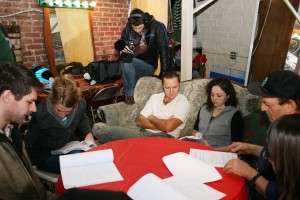 Vitaly Sumin (in baseball cap) and cast from Notes from the New World read through the script (click on the picture !)
Vitaly Sumin (in baseball cap) and cast from Notes from the New World read through the script (click on the picture !)
Baldissera: Could you tell us something about your story/past? What is your background? Do you think any person could become a movie director or producer if is their dream — even if their background is far from movie making — or do you think your background, education, and experience have the final say on your career?
Sumin: There’s a saying by Antoine De Saint–Exupéry (citing from memory): “I’m from my childhood.” In that regard as I must say, I was lucky to be born in one of the most interesting European cities with an extraordinary cultural life on many levels. Despite an officially sanctioned classical orientation imposed by the government, it provided me with a great and broad foundation.
My parents encouraged education by any and all means. Even before I was enrolled in one of the reputable elementary/secondary schools of the city, they hired private teachers in piano and foreign languages for me. Although, I must admit I didn’t like it so much back then. This was the norm in the upper middle class circles of the local society to which they belonged.
That educational background was helpful for my future endeavors. On the other hand, there are a lot of examples of guys who started from nowhere and went on to become great masters who pushed humanity forward. I think anybody could become somebody. You can have a great educational background and all the money in the world and still be unable to create. Whoever feels something is pushing her/him (you can call this “something” voices from above/below or whatever you choose) to express herself/himself and she or he cannot feel good without doing it – everything else doesn’t matter. Just do it regardless of what “the others” may say (Sartre: “The Others are Hell.”). To put it simply, either you have it or you don’t. It’s strictly between you and the mystery of creation. Nothing else counts.
Baldissera: Is this what you said you wanted to do as a kid?
Sumin: As a kid I wanted to be the captain of a ship, looking for adventures, traveling around the world.
Baldissera: What do you think is currently the biggest challenge for an independent movie-making production company such as VM Productions?
Sumin: Well, I believe whatever we have in our heads comes from somewhere and sooner or later could be realized. People dreamed of flying from the dawn of history and now nobody is surprised by airplanes, etc. The technical possibilities will evolve to fantastic levels we cannot imagine right now.
Some prestigious cinema authorities talk nowadays about the “death of cinema.” There’s nothing new about it. Not too long ago they talked about the death of theater, opera, figurative arts, the novel, etc. In one of my novels, everybody is their own director and producer. There’s no need for studios, production companies, sales agents, cast, crew and such. For the price of a ticket you’re placed in a specially equipped room where you can choose a book “to read.” Then, on a screen, you see the realization of your vision – created by the power of your conscious and subconscious mind. What remains unchanged is the storytelling. Each story reflects the three acts of life’s cycle; beginning, middle, and end.
As long as humans have existed, they’ve been hungry for stories. And that’s what counts, regardless of the level of the technology or the medium of communication. It may well be that sooner or later people will win over death and live eternally. When that happens the need for storytelling may die or take another form. But we’re not there yet.
The biggest problem for VM productions right now is to define the kindred souls around the world who are interested in the kind of stories we’re telling. To put it into marketing terms, we must define the art house niche market for our product.
Baldissera: What is the best part of your job?
Sumin: Writing.
Baldissera: What do you think of Hollywood?
Sumin: The immediate reaction most of us have to this word is associated with the glamour of the big studios, stars, the fabrication of blockbusters, Disney fairy-tales, and so on. These images are related to the desire of man from prehistory for “bread and entertainment.”
 Geographically speaking, Hollywood proper is a small entity somewhat neglected nowadays by the local beau monde, but still it’s where it all began. The city is a part of the greater Los Angeles, consisting of the city and surrounding areas where most of the studios and the indie companies (including VM Productions) are located.
Geographically speaking, Hollywood proper is a small entity somewhat neglected nowadays by the local beau monde, but still it’s where it all began. The city is a part of the greater Los Angeles, consisting of the city and surrounding areas where most of the studios and the indie companies (including VM Productions) are located.
One of the highly respected executives of a big studio told me in private conversation, it doesn’t matter to him what he sells. He could enjoy selling cars no less than selling movies. Whenever big money is involved, it’s all about buying-selling. A friend of mine, a very famous actor at the time, speaking about the Cannes Film Festival/Market, bitterly told me the following: “They buy and sell by weight.”
 Back to Hollywood: “The City of Angels,” also called “The Capitol of World Entertainment,” boasts a unique concentration of technical facilities (studios, labs, equipment rental houses, etc.) and an enormous pool of talent and skilled technicians who have come here from every corner of the world. Many of these facilities stand unused much of the time and only a small portion of the technicians and talent is employed full-time in the industry — thus rendering them available to work on a freelance basis.
Back to Hollywood: “The City of Angels,” also called “The Capitol of World Entertainment,” boasts a unique concentration of technical facilities (studios, labs, equipment rental houses, etc.) and an enormous pool of talent and skilled technicians who have come here from every corner of the world. Many of these facilities stand unused much of the time and only a small portion of the technicians and talent is employed full-time in the industry — thus rendering them available to work on a freelance basis.
These conditions create the perfect opportunity for VM Productions’ style of making movies. Because of the ever-present interest in working on quality entertainment, VM Productions is able to secure facilities at significant discounts and employ skilled technicians and creative talent for little or no upfront fees. Instead, the bulk of compensation is offered on the back end; in that sense everyone becomes a valued creative participant, sharing in both the risks and the rewards.
All in all — probably like most of us – I have mixed feelings about Hollywood. Please watch the video clip Poster for the Movie which documents the creation of the poster for Notes from the New World and summarizes some of these feelings.
Baldissera: What personality traits are required to do this job?
Sumin: The ability to go an extra mile and “never give up”.
Baldissera: What is your best memory related to your job?
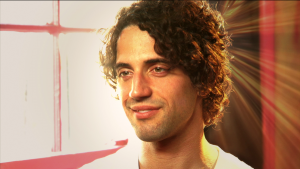 Sumin: Usually it’s the end of the last day of the shoot. There’s a certain common euphoria, this great feeling shared by almost everybody involved: “We’ve made it!”. But then everybody leaves and the director remains alone again. In a film by Francois Truffaut Day for Night is a great scene in this regard.
Sumin: Usually it’s the end of the last day of the shoot. There’s a certain common euphoria, this great feeling shared by almost everybody involved: “We’ve made it!”. But then everybody leaves and the director remains alone again. In a film by Francois Truffaut Day for Night is a great scene in this regard.
Baldissera: Have you ever met someone who inspired you to write a certain movie or even a scene? Or, more in general, have you ever met someone who totally shocked you in any way, during your career?
Sumin: One always ‘creates’ with somebody in mind … it’s rather subconscious. Right now I don’t recall anybody who shocked me in the way you’re suggesting … usually I used to be impressed (and it’s a never ending process) by some movies and books, but not by any real persons.
Baldissera: What do you think is the engine of your whole work?
Sumin: Feeling good by expressing myself based on the experience I acquired in life. If I don’t do it, I’m not feeling good.

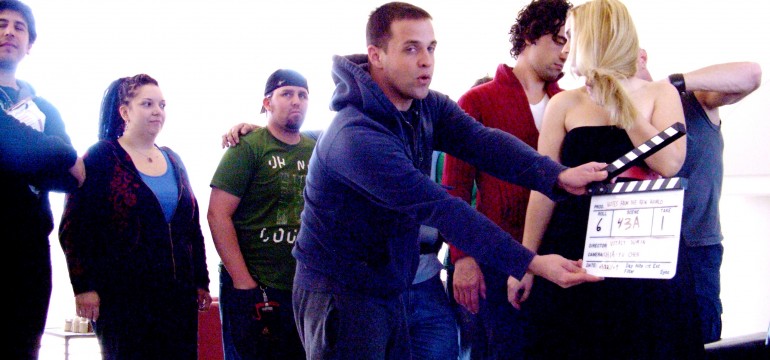
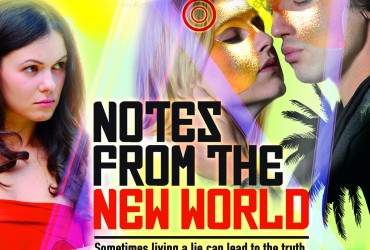
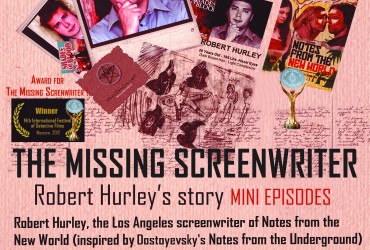



Leave a Reply